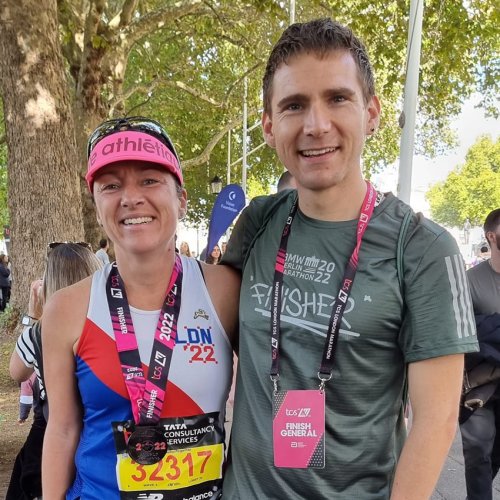Celebrating Autism Awareness Month with Regional Councillor Kevin Oakes
April marks Autism Awareness Month. Within the autistic spectrum people can have different degrees of communication and interaction difficulties whilst being diagnosed with the overarching umbrella of Autism. In the UK, there are more than one in 100 people on the Autistic Spectrum with around 700,000 autistic adults and children.
To celebrate Autism Acceptance Month, we caught up with West Midlands Regional Councillor, BRAT coach and athlete; Kevin Oakes who has Asperger’s Syndrome.
Receiving his autism diagnosis
For Kevin, it took almost five years to finally receive his diagnosis of Asperger’s around the age of twelve.
 At seven my teachers thought I was deaf and sent me for hearing tests as they thought I was not listening and they couldn’t understand why I was getting low marks in tests. At aged 7 I was told I had Pragmatic Disorder and it was not until more tests over a few years that I received the full diagnosis of Asperger’s Syndrome with the added complexity of Dyslexia aged 12.
At seven my teachers thought I was deaf and sent me for hearing tests as they thought I was not listening and they couldn’t understand why I was getting low marks in tests. At aged 7 I was told I had Pragmatic Disorder and it was not until more tests over a few years that I received the full diagnosis of Asperger’s Syndrome with the added complexity of Dyslexia aged 12.
“Autism comes with a lot of behaviour issues, and you often need to stick to a certain routine. If I was to break out of this it could end in panic attacks. Throughout school I was going to a clinic to try and help me with the panic attacks.
“I didn’t get into sport at school as it always seemed to be the popular kids in the teams which really discouraged me.”
Finding athletics and starting his journey
It is no secret that athletics and running can help support you physically, but it also can have amazing benefits on your mental health too, which Kevin is an advocate for.
“When you leave school, you lose all your routine. In my adult life, finding sport has given me that routine back. I was able to follow a club structure and give myself goals I wanted to achieve.
“I started athletics aged 16 originally to help me with my depression and anxiety which are common with Autism. I also have Diabetes, so it helped me to control this.
After getting involved myself and loving the sport, I wanted to help other people and went down the coaching route. I completed my Level 1 and 2 coaching awards and became a committee member at my first club, Bourneville Harriers. I then swapped to BRAT (Birmingham Running, Athletics and Tri) around 7 years ago and take my coaching and running much more seriously, coaching predominantly road runners from 3000m to marathon.
Joining the Regional Council and making a difference in his local community
After getting fully immersed within the athletics and running world, Kevin wanted to take his involvement one step further and really make a difference in his local area. In 2021 he was elected to his local Regional Council in the West Midlands.
“Being on the Regional Council is great. I joined to support on the coaching front. My aim is to try and increase diversity throughout athletics, especially within race and disability. I also want to educate local coaches on how to increase diversity within their clubs”
Holding a position on the Regional Council has helped Kevin to set an example to other people who are on the autistic spectrum by demonstrating that anything is possible, and their voice needs to be heard. “I believe that everyone with Autism belongs in athletics, to compete and hold governance positions. Athletics governance would really benefit from more people who are on the spectrum as they have different capabilities and bring something else to the table. On the Council we would value their opinion, and people with Autism shouldn’t be scared to share their views.”
Coaching athletes with autism and some top tips
As well as sitting on the Council, Kevin is a valuable member of the coaching team at BRAT, where he supports people with autism within his group. He gave us some helpful pointers for other coaches or club members who are wanting to better know how to help those on the spectrum.
“As a coach you need to be patient. When you coach someone and you raise your voice or seem frustrated, people with autism can take that quite personally and may become discouraged. Keep the environment nice and positive and try to keep patient and always listen.
“Another key thing is to always look for understanding. People with Autism will think they understand a piece of information but often they have misconstrued the meaning. As a coach, I will always ask someone with autism to explain back to me what I have asked them to do. If they explain in good detail then they know they understand. If there are bits missing you can re-explain but break it down nice and slowly so they can then pick it up.
“One child I am coaching comes to the social 5k run each week. He is 15 years-old from an ethnically diverse background and has Autism. Other coaches had said he was quite difficult to talk to but because I managed to engage with him, he is now thriving and running really well. If we are not fully inclusive within clubs, we risk missing opportunities to develop the special athletes of the future.”
Want to find out more?
If you want to find out more about autism and the autistic spectrum, visit the National Autistic Society.